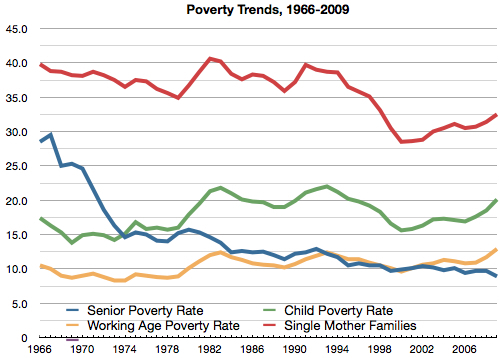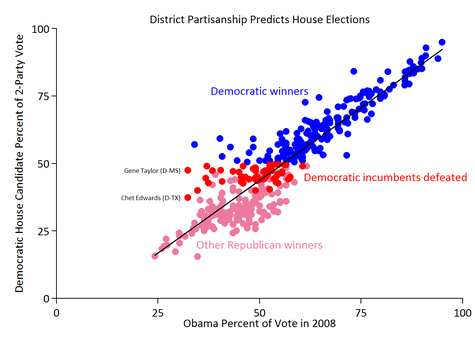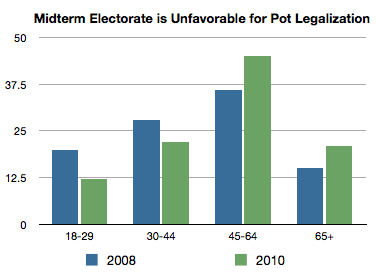Matthew Yglesias's Blog, page 2508
November 5, 2010
Addressing Social Security's Adequacy Problem
Earlier this week, Peter Orszag proposed an effort to address the long-term actuarial gap in Social Security's finances, presumably in part by reducing benefits below the currently promised level. Dean Baker shot back with a variety of arguments, one of which is the underrated observation that the Social Security benefit "is already small by international standards."
And, indeed, there are real questions about the adequacy of Social Security benefits. For example, though the Great Society was hugely successful at reducing poverty among senior citizens the existing retirement safety net has not eliminated elder poverty:
Of course this raises the question of what kind of political dynamic could help address the adequacy problem with Social Security. Silja Haeusermann of the University of Zurich did an interesting Monkey Cage post a while back about the 2003 Swiss pension reform, which combined net reductions in expenditure with increased benefits for the most vulnerable workers. She claims this is, in general, the most viable path forward for countries facing pension difficulties:
[R]eforms could be achieved, under the condition that governments combine cutbacks with elements that benefit the most precarious social groups, mostly low-skilled, young and female voters. In a book that will be out with CUP this month, I have shown that this kind of "package deals" has become a necessary condition for successful pension reforms over the last 20 years, not only in Switzerland, but also in Germany, France and other European countries.
The Social Security proposal that Orszag wrote five years ago with Peter Diamond had more-or-less this structure. Better benefits for the most vulnerable classes of retirees than currently exist, but less for the middle class majority.
That's not to endorse Orszag's plan. But it is to say that progressives should consider this adequacy issue to be more than just a talking point. It's a real issue. Social Security is supposed to keep people out of poverty, and it doesn't do as good a job of that as it could or should. Getting that changed would be desirable, whether in the context of an overall fix or not.


November 4, 2010
Endgame
Good old boys are back on top again:
— BHTV classic technical difficulties.
— The Netherlands leads the world in gender equity.
— Really looking forward to the against the wave of anti-Hispanic bigotry sweeping Arizona.
— Reihan Salam's advice for the 112th congress.
— Vince Gray's transition team looks solid.
— Fun with zoning shakedowns, Wheaton edition.
For John Boehner, it's Sleater-Kinney's "Combat Rock".


Self-Defeating Blue Dogs?
Joe Klein says Blue Dogs shot themselves in the foot:
Normally, I don't have much patience for the whining on the left about the Blue Dog democrats — who were sliced in half on Tuesday, losing at least 28 of their 54 seats. When they lose, the Democrats lose control of the Congress. This year, however, I do feel that there is an argument that, to an extent, the Dogs brought this on themselves by being penny-wise, dogpound-foolish. The argument goes like this: a larger stimulus package might have helped the economy recover at a faster clip, but the Dogs opposed it on fiscal responsibility grounds. A second argument: the public really has had it with Wall Street, but the Dogs helped water down the financial regulatory bill, gutting the too-big-to-fail provisions. There is real merit to both points. If the stimulus had been bigger and the financial reform package clearer and stronger, the public would have had a different — and, I believe, more positive — sense of the President's agenda.
Kevin Drum wants to add mortgage cramdowns to the list. I would say that a variety of aspects of the health reform process—mostly notably just the slow pace of it—also fit the bill.
But to be fair to the Blue Dogs, there's a big collective action problem. Voting "no" on high-profile legislation does help vulnerable members. Similarly, the Chamber of Commerce seems to have been effective at picking off vulnerable Democrats it disliked while protecting those it smiled upon. So in many ways the ideal scenario for a Democrat in a red-leaning district would be for other members to have passed a giant stimulus. Then you could say you voted against this $2 trillion boondoggle while still benefitting from its impact. Actually "yes" seems like a bad move no matter what the size of the stimulus.


Inflation Hawk Down
Excellent column from David Leonhardt on the inflation hawks who keep being wrong about everything:
What's striking about the last six months, however, is how much more accurate the doves' diagnosis of the economy has looked than the hawks'.
Early this year, for example, Thomas Hoenig, president of the Kansas City Fed and probably the most prominent hawk, gave a speech in Washington warning about the risks of an overheated economy and inflation. Mr. Hoenig suggested that the kind of severe inflation that the United States experienced in the 1970s or even that Germany did in the 1920s was a real possibility.
When he gave the speech, annual inflation was 2.7 percent. Today, it's 1.1 percent.
The doves, on the other hand, pointed out that recoveries from financial crises tended to be weak because consumers and businesses were slow to resume spending. Around the world over the last century, the typical crisis caused the jobless rate to rise for almost five years, according to research by the economists Carmen Reinhart and Kenneth Rogoff. By that timetable, the unemployment rate would rise for a year and a half more.
Relatedly, someone needs to tell Shahien Nasiripour to stop relying on Hoenig as some kind of populist hero. For all Ben Bernanke's flaws, he's by far the lesser of those two evils.


Prostitution Externalities
I think Adam Ozimek's post on "The Visceral Externality of Prostitution" nicely illustrates why nobody likes economists:
Say Ray's friend Lenore wants to purchase Ray's prostitution services and she values them at $400. But when Lenore does this it bothers Ray's other friend Tonya. If the negative utility Tonya experiences is worth more than $400, then the market provides a mechanism for Tonya to satisfy her wants: she can pay Ray $401 not to sleep with Lenore. [...]
People will probably object that this is unbelievable, and that even if it happened once in a while, in the real world this would never be enough objectors to affect the quantity of prostitution. I think this is correct. After all, the objectors would have to value preventing prostitution at more than average rate of $300 an hour in order to outbid the existing buyers. But what this tells you is that the marginal utility gained from prostitution by consumers would vastly exceeds the marginal disutility to objectors.
I think objectors know. After all, market based solutions are possible and yet you never hear objectors push for anything but prohibition. This tells me that their willingness to pay is pretty low, and therefore so is their disutility.
This misses the fact that a big part of the point of prostitution prohibition laws is to express social disapproval of prostitutes and prostitution. Indeed, people seem generally quite unconcerned about whether prostitution is occurring someplace out of sight and out of mind. But they want to reserve the right to strongly disapprove of both the prostitution and especially the prostitutes. You can analogize a person who engaged in a form of sexual or commercial conduct of which you disapprove by referring to that person as a "whore." It's an insult. Its insult status reflects and upholds a social consensus that whores are bad people, not just that whoring is a kind of undesirable nuisance. Side-payments can't address this issue.
I think the best way to think about prostitution prohibition is just to observe that we've historically done a lot of stuff to bolster the privileged position of heterosexual companionate marriage. This has entailed a lot of avoidable cruelty to gays and lesbians, sexually active women, children of unmarried women, and voluntary prostitutes. But the cruelty isn't a pointless side-effect that can be reduced through better policy design. The cruelty is integral to obtaining the objective. Over time, counterveiling humane impulses have tended to win out. But that's the issue.


If QE2 Inspires Foreign Investment That, Too, Will Help Boost US GDP

(cc photo by LateNightTaskForce)
One of the reasons you can tell that though QE2 may be too modest to do much good, it's still a step in the right direction, is that its strongest critics have critiques that just don't add up. The Cato Institute's Mark Calabria, for example, says we should be worried that QE2 will succeed in pushing the price level up closer to its trend level. But there's no reason to worry about that—doing so would be a good thing. Similarly, Pete Davis lays out a theory whereby higher inflation expectations harm the economy:
Will it work? Yes and No. It should raise short-run growth, but only if this money is put to use by American businesses and consumers. If they fear further weak growth and long-term inflation because the Fed may be unable to unwind these massive liquidity injections fast enough, it could easily end up being saved and invested overseas. So a lot depends upon market and consumer perceptions of whether the Fed picked a large enough liquidity injection to raise growth, but a small enough one to avoid fears of future inflation. The Japanese experience with quantitative easing a decade ago was that it didn't work very well.
I completely disagree with this. The Japanese experience with quantitative easing was that it didn't work very well at raising inflation expectations. But higher inflation expectations boost growth in a severely depressed economy (note that the "in a severely depressed economy" part is an important qualifier). Higher inflation expectations are likely to inspire cash-hoarding firms to unload their money and invest it in something. There are two choices here. One is that they might invest it in expanding their real economy activities here in the USA. That would boost growth. The other, as noted by Davis, is that they might invest it abroad. That would decrease the value of the dollar boosting import-competing and exporting US-based firms. That would boost growth.
As I mentioned yesterday on BHTV it's important to be clear about what "more inflation" would mean in this context. Relative to where we are today, the inflation rate of the Clinton and George W Bush administrations would be "more inflation." Relative to where we are today, the inflation rate of the "Morning in America" recovery of 1983-90 would be a lot more inflation. Saying "Yglesias wants inflation" sounds bad. Saying "Yglesias wants to return to Reagan-era levels of inflation" sounds much more reasonable.


Stuff Doesn't Matter Very Much
It's natural in the wake of an electoral defeat for progressives to argue that Democrats would have done better had they been more progressive, while "centrists" argue that Democrats would have done better had they been less progressive. The reality is that Democrats would have done better had the economy been in better shape. And the most important fine-grained analysis you'll get will comes from John Sides who shows that far and away the most important factor in determining who got re-elected was the underlying partisanship of the district:
In all 402 contested House elections, the 2008 presidential vote in that district would explain 83% of the variation in the Democratic House candidate's vote share. Nothing else in our dataset comes close.
Honestly if there's one thing this blog could accomplish, I would love to increase the level of awareness on the Hill of this fact and of the importance of the macroeconomy. The fact of the matter is that members of congress should vote their conscience on issues of significance. The political importance of issue positioning is dwarfed by the political importance of objective reality, and the political impact of votes on legislation is dwarfed by the substantive impact of votes on legislation. If staffers and members of congress cut the time they spend thinking about "strategy" by fifty percent and reallocated it to learning about the issues on the merits the world would be a much better place and the electoral outcomes would be extremely similar.


The Other Non-Discretionary Spending
Sallie James observes that Republicans' zeal for spending cuts doesn't extend to cutting farm subsidies. She might have added that though people usually think of "entitlement" spending as meaning Social Security and Medicare, farm subsidies are another category of spending that would be left unmolested by a cap on "domestic discretionary spending."
Basically the currently elderly, people living in rural areas, and people whose income depends on the military-industrial complex would all be protected from a drive that focuses specifically on domestic discretionary. Not coincidentally, these are many of the people inclined to vote Republican.
I think it's important for progressives to get smarter about the fact that there's really very little evidence for the proposition that there's a debate in America about the merits of "small government." There's a conflict, instead, about whose interests the government should serve—a conflict whose basic contours you can learn a lot about by examining the demographics of each party's core constituency.


The View From China
Via James Fallows, a slice of Chinese media perspective on the midterms:
Global Times/Huanqiu Shibao (Daily, circ. 1.5 mil) [ 环球时报 - "Global Times," an influential but fairly raw-meat nationalist paper]
The U.S. looks for a scapegoat for its decline (pg1)
Quote: The world media believes that Americans did not take into serious consideration the current administration's policy adjustments but abruptly hoped their leader would instantly bring them back to the golden time after Cold War, which is impossible. Obama has been completely denied. It is believed to be a "thought riot" in the U.S…. Yu Wanli at Peking University's Center for International Strategic Research said that Americans will become more impatient than usual due to the elections. What Obama has encountered right now is because he has become the scapegoat for U.S. decline.
To state the obvious, the United States and China are very different societies. But one point we have in common, that separates us from our European partners, is that both are very large societies whose scale has allowed us to preserve a remarkable amount of solipsism even in the face of rapidly falling costs of transportation and communication. So in the United States you had a rash of really thoughtless China-bashing midterm ads, and in China you have this slightly odd conceit that Americans are primarily driven by China-related anxieties rather than primarily being totally indifferent to the world beyond our borders.
Managing this relationship is going to be one of the most important tasks of not only the current president, but all national political leaders for the next generation or two. I wonder if this kind of gigantism-induced mental isolationism will make the landscape easier or harder to navigate. The good news, after all, is that it is a real common point of reference.


Marijuana Legalization Likely to Have Better Luck Next Time
Like Kevin Drum I think the 46% of the vote secured by the marijuana legalization initiative in California is a pretty good number. And it makes me bullish on the near-term future of pot legalization out west if people draw the right lessons from the 2010 experience. First and foremost among them would be that you need to schedule this vote to coincide with a general election when young people will vote. The theory that putting Prop 19 on the ballot would drive youth turnout up was cute, and perhaps even worth trying, but as best we can tell absolutely nothing changes the fact that young people don't vote in midterms:
Several other considerations made 2010 an unpromising year. The first is that bad economics times make people less socially tolerant. Many older white people in this country are in practice torn between libertarian and cranky authoritarian strains of rightwing politics, and the recession has brought out the cranky in spades. Relatedly, obscenely wealthy libertarians spent the 2010 cycle at something like a maximum level of illusionment with the Republican Party. In 2006 or 2008 a lot of donors would have been looking to give to a cause like this who instead in 2010 were more invested in conventional politics.
Last but not least, Prop 19 was hampered by a severe lack of elite validators. Democratic officeholders and candidates largely didn't want to touch it. But a 46 percent showing indicates that this is hardly political kryptonite. I don't expect risk-averse politicians (i.e., politicians) to leap to get behind the cause en masse, but these results show that if you're interested in taking a mildly bold step in order to stand out from the pack the downside risks here really aren't so terrible.
Long story short, pre-election I thought of this as a totally quixotic undertaking but it now looks to me like it could realistically happen in the short-term if people organize for a presidential election year. Running the play again in 2012 might just disgust people so maybe 2016 would be the better target year. Or else maybe 2012 in a different state. Either way, I promise to be more engaged next time.
(Let me also add that government by ballot initiative is generally pernicious and that states would be well-advised to do away with it, but the ability to move forward on this kind of issue is one of the rare advantages to an initiative system so people should exploit it).


Matthew Yglesias's Blog
- Matthew Yglesias's profile
- 72 followers










